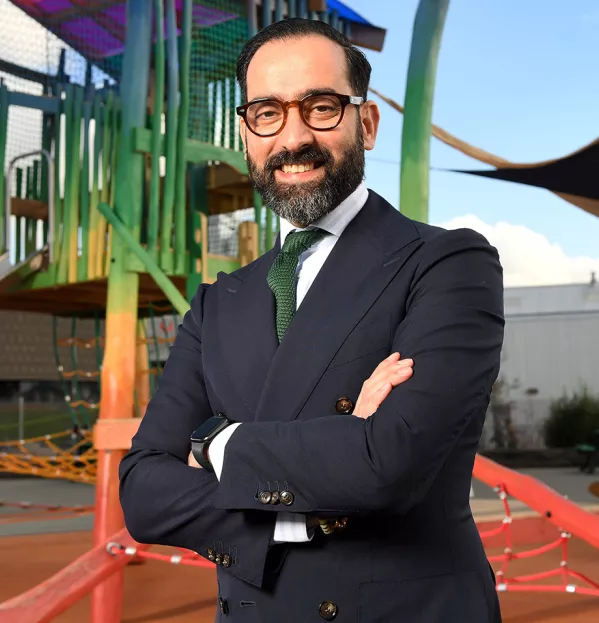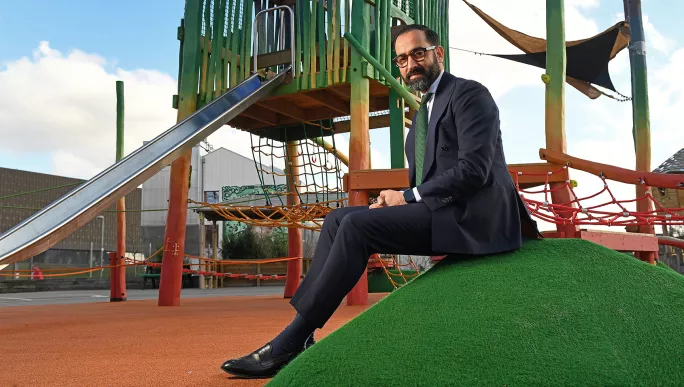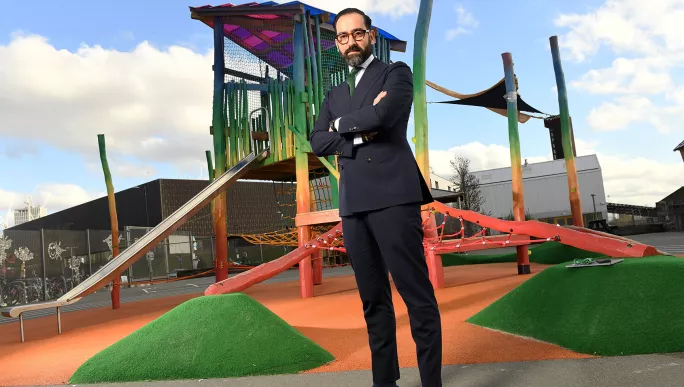- Home
- Leadership
- Strategy
- 10 questions with...Mohsen Ojja
10 questions with...Mohsen Ojja

Mohsen Ojja is acting chief executive of The Mossbourne Federation in Hackney, East London, which comprises four schools and one sixth-form college. Before he took on the role, he was principal of The Crest Academies and national director of education at E-Act.
He chatted to Tes about his own experiences in education, who has influenced his career and why he’d want to be the last education secretary the nation ever had.
1. Who was your most memorable teacher and why?
I went to three different schools for primary in Spain and then three different schools for my secondary [education] in Spain, Morocco and Austria.
If I think about one particular teacher that really marked my experience, there was a physics teacher in Austria who was very different from the others because he didn’t dress the same.
We didn’t have a uniform but he dressed very cool and I don’t know if that coincided with my uncomfortable teenage phase, where I was always looking for something that was different, but he was very funny and not very formal.
He also had a really interesting way of bringing physics to life and making it quite easy to understand - and I went on to specialise in physics in my Baccalaureate.
But we all thought he was a spy or ex-spy…because, in one lesson, we were learning about nuclear physics and he started to explain how his previous work as a nuclear physicist in Iran helped him with a particular problem.
We all looked at each other and said: “Did he really just say that?” So I said: “Did you just say that you worked in a nuclear plant?” He said: “Yeah, I was a French engineer.” So we had a theory he was a spy!
2. What were the best and worst things about school?
One of the great things about my experience at school was that, from the outset, I was accepting of difference.
For me, being different was normal. From age five, I had Asian, Black, Latino, Spanish, French and Tunisian friends. I sat next to people from different continents.
I didn’t realise at the time that that is a very privileged position to be in, but I think the acceptance of difference meant I was more aware of that as a young child and more tolerant.
The other thing was languages. English is my fourth language and I can switch between French, Spanish and Arabic - and a bit of German from when I was in Austria.
Also, being in international schools means I have friends all over the world, from Berlin to Los Angeles - it’s really great that we’re dotted all over the world.
But this is also a bit of a negative, too, because unlike most of my friends now, I haven’t had a secondary school experience where I can say I grew up in this town or this city, went to the local school and developed roots there. And that, sometimes, is missing.
I also struggled with the transition sometimes between schools. In Morocco, it was very loose and easy; we had a surf club on Saturday morning. But then we rocked up in Austria and it was very dark, very cold and I thought: “What is going on?”
In school, too, it was suddenly very formal and very aristocratic, and it was fascinating to make that switch but I did struggle with the transition - because also you had to find a new cohort [of friends].
3. Why do you work in education?
I felt I needed to do something that would benefit me in a sense that it would make me feel good. If I were to work hard, I wanted something that was rewarding beyond earnings.
And my dad’s story is a powerful example of what education can do because he is the reason why I was able to access and experience what I’ve experienced.
My dad comes from a very poor background in Morocco and he was destined to work in the fields and sell on the market.
But he challenged that by finishing his education and that meant he was able to enter a profession [as a diplomat] that enabled him to travel the world and offer us what he offered.

So, I’ve experienced at first hand how education can transform people’s lives, and I genuinely believe that everybody is entitled to a great start in life - education offers that.
4. What are you most proud of in your career?
If I’m to focus on one recently…when I joined the federation, one of my priorities was to support Mossbourne Parkside Academy, near Hackney Central station.
That school was never ever “good”, so whatever denominations they had with Ofsted that equated to “satisfactory” - that was the best it had ever achieved.
It was stubbornly underperforming, but to have worked with the parents, teachers, the senior leaders and the governors - and to see how quickly we’ve transformed it and achieved a “good” rating, so we can say to the community, “you can access a good standard of education” - that’s brilliant.
5. What would be your perfect school staffroom?
I thrive on quick conversations with people and I think, working in an environment like Mossbourne, the leaders here are absolutely phenomenal. It’s not always plain sailing, because great leaders are very demanding and have very high expectations, but I would definitely say the staff leaders in the Mossbourne Federation. I’m very lucky to work with people that are phenomenal.
6. Who in education has influenced you the most?
First, I have to mention Dame Joan McVittie, whom I met in 2015, when I first started at The Crest Academy. Her wisdom and advice were phenomenal.
She taught me loads, and her coaching and mentoring has been quite significant. She embodies the kind of wisdom in education I think we all need to have at some point - that no-nonsense person that we run things past.
Then the other one is Matt Jones. Matt is the executive principal of Globe Academy, but not only is he really committed to that [role], he also created The Elephant Group.
The Elephant Group is a charity he set up to challenge the inevitability of Russell Group universities admitting a disproportionate number of privately educated pupils by focusing on supporting the top third of state-educated pupils to access the top third of universities.
For him to actually put his money where his mouth is - and start the charity and recruit a team and run a charity that’s operating across the country - is truly inspirational.
7. What are the best and worst aspects of our school system today?
The best thing about the system is the recent focus on curriculum and pedagogy, and how this has really shifted mindsets to focus on what matters in schools
You can’t have a great school if you don’t have clarity about what you teach and how you teach it.

The consequences of saying “the curriculum matters” have led to more teachers talking about curriculum design, implementation and the impact of their curriculum. That is what matters in terms of giving the best chances for pupils and getting the best schools.
The worst thing about the system, unfortunately, is that in spite of all of the great stuff that happens, the range of quality is very wide - you still have pockets of poor provision, especially in communities that need it the most.
8. If you became education secretary tomorrow, what would you do?
I’d like to be the last education secretary appointed as a political appointment because I think education is too important, and has too long-lasting an impact, to solely depend on one individual.
But what I’d is establish is a clear set of school standards for good education - fully funded, fully resourced - that include not only aiming for great grades, but beyond - so entitlements for extracurricular activities, for a high-quality sports programme, and a coaching programme that goes beyond subjects in school, too, so if you want to have a career in medical studies, you’re supported to do that.
Then schools would either meet that standard or wouldn’t. It’s simple - you either meet their standard required or you don’t.
So, if you’re a medical student, you don’t get graded as a first, a 2:1 etc, because patients don’t want to know that you just scraped your degree. Instead, you have to meet the standard that’s required to practise. I think it should be the same for education - asking, “are schools meeting the standard?”
If it’s yes, that’s great, and if it’s not so good and then we deploy the resources needed to make sure they can meet the standards. That’s what I’d do.
9. What will schools be like in 30 years’ time?
I’d like to think the conversations that are happening at the moment about curriculum and pedagogy will continue to enrich the profession, so we reach a point where the profession is much more skilled and self-sustaining,
Because if we’re serious about teaching being a profession, we need to reach that point where, because of [teachers’] knowledge, because of their specific expertise, they can dictate what needs to happen.
10. What are the most important lessons you’ve learned in this role?
For me, the biggest lessons are that I became a better teacher and a better leader once I was clear about who I was, what my values were, what was driving my actions day in, day out and what I wanted.
There’s so much noise around in education - there’s Ofsted, there’s the Department for Education, there’s Covid, there are parents, there’s the local authority - but once I was able to anchor it into my values, my non-negotiables; once I was very clear about what wanted - I think that was the biggest lesson for me.
And the other one is that nothing can be achieved in education as an individual. As a leader, it’s about knowing what you want and who you are, and accepting that, no matter how big your ego is, you’ll never be able to achieve it all by yourself.
Mohsen Ojja was talking to Dan Worth
You need a Tes subscription to read this article
Subscribe now to read this article and get other subscriber-only content:
- Unlimited access to all Tes magazine content
- Exclusive subscriber-only stories
- Award-winning email newsletters
Already a subscriber? Log in
You need a subscription to read this article
Subscribe now to read this article and get other subscriber-only content, including:
- Unlimited access to all Tes magazine content
- Exclusive subscriber-only stories
- Award-winning email newsletters



